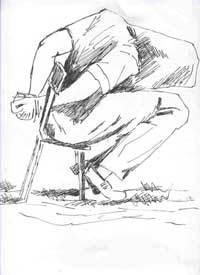By Alan Bean

Jon Burge
Jon Burge (rhymes with ‘surge’) was hired by the Chicago Police Department in 1971, just three years after the police riot at the 1968 Democratic convention. Chicago was looking for a man with Burge’s unique skill set. Described as “all man” by the men who interviewed him for his first job with the department, Burge was studied in the arts of torture; records suggest he learned creative uses for electricity while interrogating prisoners in Vietnam.
Soon Jon Burge was slipping plastic bags over his victim’s heads before attaching electrodes to sensitive parts of the anatomy. He would then crank the handle on a little wooden box. The combination of suffocation and agony produced confessions in short order.
Soon Burge was presiding over a team of detectives famous for solving horrifying crimes by extracting confessions from suspects. No one asked too many questions. Burge and company have always denied that suspects were tortured, and his superiors were willing to give him the benefit of the doubt. Until 1991, when Burge’s luck ran out.
Prior to the Wickersham Report of 1931, torture was routinely used throughout America to extract confessions from the “bad guys”. It wasn’t legal, even then, but everyone knew what was happening. “The third degree” was a polite synonym for torture. Suspects were beaten, scalded and electrocuted into compliance. At the time, the law enforcement community was convinced they couldn’t do their jobs properly if deprived of the third degree.
The Wickersham Report was inspired by law enforcement’s failure to enforce Prohibition. Only when investigators took a peek beneath the surface did the widespread use of torture come to light.
Researchers argued that third-degree techniques made it impossible to know if a suspect was actually guilty or merely copping to a crime to make the pain stop.
Police officers would pick a suspect, extract a confession through torture, then build a case to suit the details of the confession. This often required threatening potential witnesses with beatings and perjury charges if they refused to corroborate the state’s narrative.
When the case went to trial, police officers routinely lied on the stand. The biggest lie was insisting, under oath, that no one was tortured in the course of the investigation.
Initially, the third degree produced scores of easy convictions, but unintended consequences began to accrue. Juries began acquitting criminal defendants because police testimony was viewed as inherently suspect. The third degree, it turned out, was a great way to close cases, but a lousy means of convicting the guilty.
Forty years after it was officially repudiated, Jon Burge and company revived the third degree in Chicago. But in 1991, twenty years after joining the force, Burge was fired when an investigation determined he and his men had tortured a man suspected of killing a police officer.

This week, Chicago mayor Rahm Emanuel backed a plan that would pay fifty of Burge’s victims (more than 200 have been identified) up to $5.5 million in reparations. The police commander served three years in federal prison on perjury and obstruction charges and is serving the final year of his sentence on house arrest. He continues to receive a monthly pension of almost $4,000.
When I claim that God ain’t no Jon Burge I mean that God doesn’t resort to torture (or threats of torture) to get his way. God doesn’t need a little wooden box to extract confessions from the guilty.
Evangelists claim they couldn’t do their job without the third degree. Why would anyone choose to be a Christian, they ask, if they didn’t think a Burge-like deity was waiting to slap a plastic bag over their faces before attaching those nasty electrodes and cranking that nasty wooden box? If crime pays, what will stop the criminals.
Threats of divine torture in the not-so-sweet-by-and-by once worked sufficiently well, at least on some suspects. But those days are gone. Most Americans (60% by one recent survey) say they believe in hell (including a slight majority of mainline Protestants), but most feel you have to do something really awful to go there, and practically no one thinks they fit the bill.
But whether the threat of torture availeth much or little, the doctrine raises questions about the character of God.

The Westboro God revels in the death of practically everyone, gays and Muslims in particular. Like Jon Burge, their God has refined the arts of torture and can’t wait to strut his stuff.
Good people everywhere are horrified when Westboro Baptist yells despicable slogans at military funerals; but is Westboro theology, stripped of the over-the-top rhetoric, that much different from what most Americans believe?
Only in one particular. We believe only the baddies are going to hell; they believe practically everyone in America is headed for the pit.
For a long time no one paid the folks at Westboro Baptist Church any mind. Then someone had a eureka moment: what if we express these precious truths in the most objectionable way imaginable? It took a while to come up with something as toxic as “God hates fags,” but the church didn’t quit until its shtick was perfected. They’ve been making headlines ever since with dismal regularity.
We love to hate the haters.
But if our God is willing to torture the intransigent for eternity (whether they be few or many) doesn’t the deity bear a marked resemblance to old Jon Burge? We may object to Westboro’s syntax, but their theology possesses a relentless logic.
However you slice the theological cheese, if God punishes unrepentant sinners, and if the GLBT community (and practically everybody else) is guilty of unrepentant sin, Westboro Baptist Church has the equation about right.
Denny Burk, a Southern Baptist professor of biblical studies at Louisville’s Boyce College, did us all a favor when, in good Westboro spirit, he argued that same-sex attraction is just as sinful as gay sex. Burk doesn’t care if sexual orientation is innate or chosen; it’s rebellion against God.
Denny Burk’s God is meaner than Jon Burge. Way meaner. A little wooden crank box can’t hold a candle to the blazing fire of eternal hell.
If I thought God looked even a little bit like Jon Burge (or any other torturing thug you might name) I’d get in line behind Ivan Karamazov to turn in my heaven card.
But God ain’t no Jon Burge. God doesn’t need threats of torture to get through to a broken humanity. He has the amazing love revealed in Jesus Christ, and that’s more than enough.
